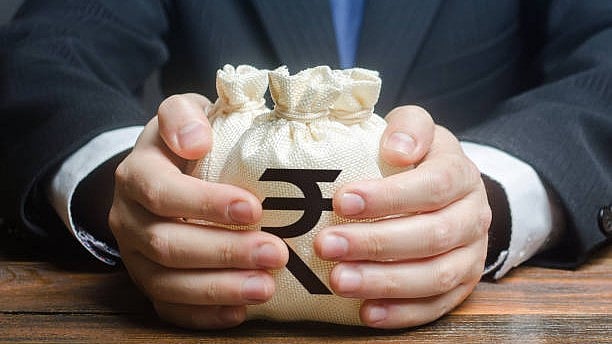
Representative image of a money bag carrying the Indian Rupee symbol.
Credit: iStock photo
‘All I want is a better education and life for my two children. For that, I’m willing to sacrifice everything!' This is the answer I often hear from parents in my ward in Bengaluru when I ask why they borrow, plead and sometimes resort to desperate measures to pay school fees.
The just-released Government of India's National Sample Survey (NSS), Comprehensive Modular Survey-Education, June 2025, shows the scale of the problem in Karnataka, particularly in urban areas.
The first finding is that parents in urban Karnataka have almost given up on government schools. Nearly four in five children (79%) in urban Karnataka study in private schools. This is significantly above the national average of 70% and almost double the figure for Delhi, where only two in five children (42%) go to private schools.
In rural Karnataka, government schools still serve 71% of children, but largely because there is little choice -- a subject for another grim story.
Secondly, the survey shows that the average annual cost of private schooling in urban Karnataka -- including fees, transport, books, uniforms and so on-- is nearly Rs 42,000. This is about one-third higher than the national average of Rs 31,800 and the fourth highest among states.
Thirdly, a growing number of children also attend private tuitions, adding another Rs 10,500 on average per year.
Taken together, parents in urban Karnataka spend close to Rs 50,000 a year per child and roughly Rs 1 lakh for two children.
That is not the full picture. The Karnataka government's education budget this year is Rs 40,954 crore, which works out to around Rs 34,000 per child annually across the state's 1.2 crore school-going children (attending government or private schools). This is taxpayer's money -- collected through GST, fuel tax, excise, and income tax-- it’s really the public who indirectly pay Rs 34,000 per child.
Adding the state's expenditure of Rs 34,000 per child to the average household spending of Rs 42,000 on private schooling, plus tuition of Rs 10,500, the total annual cost comes close to Rs 87,000 per child per year! How can any poor or middle-class parent afford this? The burden is often overwhelming.
What do these parents receive in return? In 2025, the SSLC pass percentage in private schools was just 75% (with the government schools performing even worse). Many families feel they are paying heavily without being assured of quality.
The result is clear: a weak government school system and an expensive private school network, both struggling to deliver consistently high standards, leave parents in Karnataka anxious and stretched, struggling to provide their children with a good education.
Why has this happened, and what can be done?
Over the years, schooling in Karnataka has become a big business, often sponsored and owned by a corrupt political nexus. Irrespective of the political party or ideology, politicians look at the education sector as another lucrative enterprise. Fee hikes are frequent, while investment in teaching quality and infrastructure remains limited. Government schools, meanwhile, have been neglected, leaving parents with few alternatives.
The answer to the second part of the question is also evident. Examples of improvement exist. Delhi's government school reforms between 2015 and 2025, initiated by the AAP government, are now widely cited as a global case study. The model shows the impact of strong political will. With sustained investment in teaching quality, curriculum, infrastructure and accountability, the system achieved marked progress within a decade. Today, nearly six in 10 students in Delhi study in free government schools, enrolments continue to rise, and CBSE results surpass those of many private schools. Thousands of students are entering premier higher education institutions for engineering and medical streams at no cost to their parents. At the same time, fee hikes in private schools have been strictly regulated.
This shows that change is possible with political will and consistent effort. Karnataka, too, must aim to provide affordable, high-quality public education so that parents can realise their deepest wish: a good education and a better future for their children.
(The writer is treasurer of the Aam Aadmi Party, Karnataka)